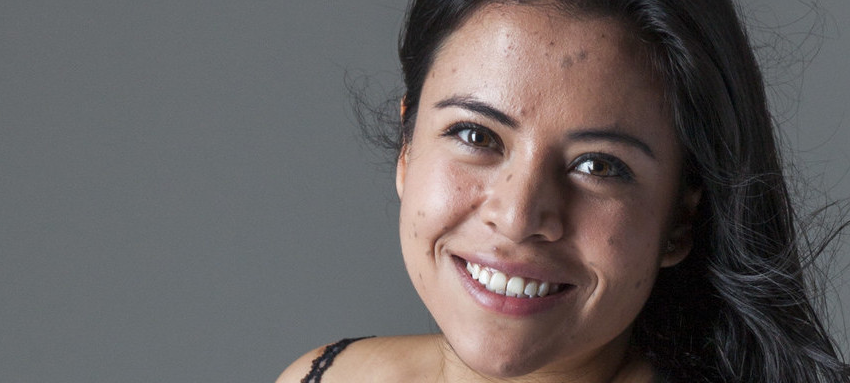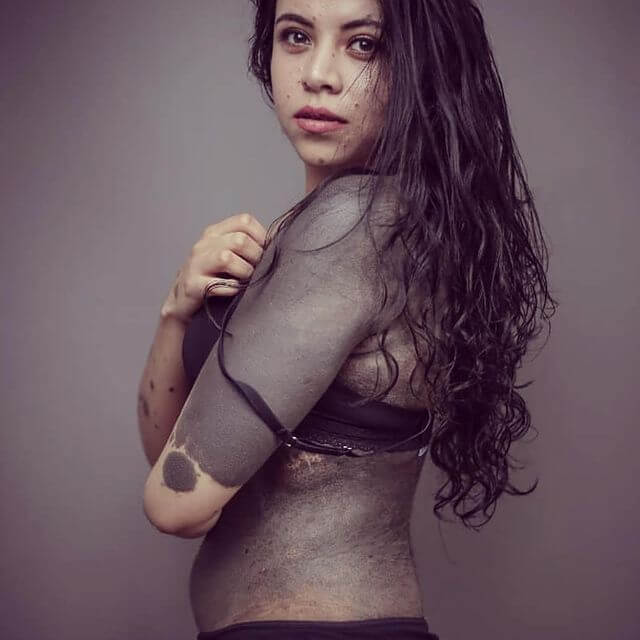Body Positivity and self-esteem: a chat with Lore Bolanos
Lorena Bolanos tells us how does it feel to live with Giant Congenital Melanocytic Nevus Syndrome.

We are accustomed to considering the focus of Body Positivity very common aesthetic characteristics: overweight, excessive thinness, and hair. These components are usually modifiable and subject to important and effective normalization processes that lead to increasing inclusivity. What happens, however, when one's body is affected by pathologies that influence one's appearance, self-esteem, and others perception?
Not wanting to talk about it from the outside, we chose to meet and ask a few questions to Lorena Bolanos. This Mexican girl suffers from Giant Congenital Melanocytic Nevus Syndrome, which makes her skin dotted with large moles. Lorena has been active on social networks, pursuing a personal journey that has raised her self-esteem in recent years. During this period, she accepted her body and helped many people with similar problems to hers, often victims of body shaming. That's why she seemed perfect for us to discuss and broaden our point of view.

Hi Lorena, would you like to tell us about the changes in your life in recent years?
A turning point in my life came when in Spain I was approached by a lady who told me how her daughter had the same skin condition as me. This gave rise to the desire to learn more about it and I soon discovered that in Europe, unlike in South America, there are associations that support those who have this type of problem, especially from a psychological point of view.
Shortly after, through social networks, I met an Australian photographer who was working on her book Underneath We Are Women. This project was designed to highlight and thus normalize physical peculiarities often ignored by Body Positivity. We met up in the United States to do a photoshoot with other women with special physical conditions. From that moment on I continued to use social networks, and I did it only for myself: they helped me to stop being afraid to show my body to avoid prying eyes and criticism. My posts immediately received positive comments and many from people with similar conditions to mine, but who still didn't feel safe showing themselves in public. These reactions simply made me feel better and my self-esteem gradually improved.
Now I live in Australia, where I am collaborating with the university for a research project on moles: they had never seen a case like mine.

Do you think there is a more open mindset in Australia than in Mexico?
I've been living in Australia for two years. People here are much less concerned about their outward appearance and the way they dress. Here you can go out dressed simply and comfortably. Getting used to this has been a liberation: now I can worry about other things like health, which are not so trivial.
Did your physical condition affect your childhood and adolescence?
It affected me much more during my adolescence: when you are a child you don't realize your appearance and you don't know malice. As you grow up you start noticing things and, more importantly, people start pointing them out to you: that's when the bullying came, the other kids soon started making fun of me. We all observe and are curious when we see something new. The problem comes when you don't have a culture of respect and you're not aware that not everyone is the same and diversity should be respected. It depends a lot on the culture: in Australia people almost don't notice me. In Mexico, on the other hand, the "culture of rejection" is very strong. I think that thanks to social media people are starting to be more open, but less so than in Australia, especially in terms of mutual respect.
Have you ever thought of using surgery to remove your moles
When I was a child they tried to remove my moles through laser, here is why I have a scar on my chest. A doctor convinced my parents to try this method as they didn't know my condition well and put a lot of trust in doctors. I am grateful to them for deciding not to continue: that operation was painful, and they preferred to leave this decision to me so that I could choose in the future and in an informed way. I once met a girl who had moles like mine all over her arm and tried to remove it with surgery: she immediately regretted it because now she is ashamed of a scar. In any case, the solution is to accept yourself and be happy with how you are because there will always be something about you that you don't like.

Is there anything you want to say to those who still feel insecure?
Mostly this: you have to accept yourself. Some things can be changed, but others simply have to be accepted. Some characteristics can be changed to like yourself more and feel better: for example, I now exercise to keep my body healthy. However, we cannot expect someone to praise us all the time. I realized that in the past I was always looking for people's compassion because it's something you can take refuge in. So, you have to stop being a victim because only if you act like one will you be one. For example, now when I look at myself I feel good: I know that people are looking at me on the street just because my body is different and they are simply observing me, but that doesn't hurt me anymore. I could have continued to feel insecure from all these looks, the only thing that would have happened is that I would never be happy. It all depends on the power of being comfortable with yourself and understanding that not everyone is looking at you and that it's not possible to please everyone.
What do you think about the criticism of the body positivity movement?
It's complicated: I guess body positivity is misinterpreted. I think it's not fair to justify weight issues like obesity. However, it's always about mediating and not imposing. In my opinion, we're going back to the same vicious cycle: only now the idea of "Yes, I'm overweight and that's okay" is being imposed. That's fine, if you want to let your hair grow is fine, that's respected. But this isn't about criticizing someone for what they choose to do with their body. Now it seems that the people to be targeted are those who are thin and who exercise: probably they simply like to work out and stay healthy. At the same time, many people cannot lose weight due to health issues. It's simply a matter of respecting and stopping judging.

Do you think the beauty industry is changing its attitude? Is the situation getting better?
A little bit, yes. However, I think the stereotype of the perfect woman is still being imposed. It's probably still the same, but trying to make it look better. I think there is a lack of consciousness and a need to reflect on how the problem is not just about weight and hair. I feel that not enough importance is being given to the infinite number of problems and situations that cannot be changed: weight and hairs are not the only elements from which self-acceptance passes.
Did you like Colibry?
Yes, very much. Especially the Konjac Sponges won me over: my skin is super sensitive, and these sponges are super gentle and perfect in my case. Plus, I appreciated the attention to packaging and eco-sustainability.
Want to know more? Buy the book here.
